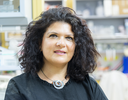TIGEM Scientific Director Principal Investigator Head of Retinal Phenotyping Facility Other positions: Professor of Medical Genetics, Department of Advanced Biomedicine, University of Naples "Federico II", Italy
Alberto Auricchio, MD is Professor of Medical Genetics at the Department of Advanced Biomedicine, University in Naples “Federico II”, and Scientific Director of Telethon Institute of Genetics and Medicine (TIGEM) in Pozzuoli (NA), Italy. His research is focused on gene therapy of retinal and metabolic diseases using adeno-associated viral vectors. His group has contributed to the phase I/II clinical trial of Luxturna, the first approved gene therapy drug for an ocular disease, and to the development of gene therapy for mucopolysaccharidosis VI in an ongoing phase I/II trial. Prof. Auricchio is co-author of more than 150 peer-reviewed publications in international scientific journals and inventor of several international patents on the use of viral vectors for gene therapy. Prof. Auricchio is founder, shareholder and consultant of InnovaVector, a CMO for production of AAV vectors, and AAVantgarde Bio, a spin-off interested in developing novel gene therapies for blindness. He is a member on the editorial boards of various journals and of the Executive Board of the European Society of Cell and Gene Therapy. Prof. Auricchio has received the Outstanding New Investigator Award of the American Society of Gene Therapy and the International Prize for Scientific Research “Arrigo Recordati”. Prof. Auricchio is a multi-grantee of the European Research Council.
Principal Investigator Molecular Therapy Program Coordinator Head of Translational Incubator Other positions: Professor, Department of Translational Medicine, University of Naples "Federico II', Italy
Nicola Brunetti-Pierri graduated in Medicine and trained in Paediatrics at University of Naples “Federico II”. He then moved to Baylor College of Medicine, Houston, TX, USA for a post-doctoral fellowship and for clinical training in Medical Genetic and Biochemical Genetics. He became assistant professor in the Department of Molecular and Human Genetics of Baylor College of Medicine and held this role until 2010 when he returned to Italy. As a physician-scientist his research goals are to elucidate the pathogenetic mechanisms and to develop new and more effective therapies for genetic diseases. He has defined the clinical phenotypes and identified the molecular bases of several genetic diseases (lathosterolosis, 1q21.1 deletion and duplication syndromes, FOXG1 duplication syndrome, blepharophimosis intellectual disability syndrome [BIS]). He developed proof-of-concept data supporting the efficacy of small molecule drugs for maple syrup urine disease, pyruvate dehydrogenase deficiency, urea cycle disorders, and Myhre syndrome. He has a long-standing interest in liver-directed gene therapy for inborn errors of metabolism, and has received awards from the American and the European society of gene and cell therapy (ASGCT and ESGCT). His research has been funded by the National Institute of Health and the European Research Council.
Associate Investigator Head of Behavioral Core Other positions: Principal Investigator, Neuropsychopharmacology Lab, Institute of Biochemistry and Cellular Biology, National Research Council, Italy
Elvira De Leonibus graduated in Developmental Psychology and did her PhD in Psychobiology and Psychopharmacology at “La Sapienza”, Rome. She then moved to the Catholic University of Nijmegen (The Netherlands) for a post-doctoral position. Her main research interest has been the neurobiology of learning and memory in normal and pathological conditions. In 2007, she joined the TIGEM with a semi-independent research appointment to contribute her expertise in pre-clinical research to the discovery of novel genetic and pharmacological therapeutic approaches for human genetic disorders. Since 2010, she has held a full appointment as Group Leader of the Neuropsychopharmacology lab at National Research Council (CNR). From 2014, this role has been held with a joint appointment as a member of the TIGEM Faculty.
Supported by grants from the American Alzheimer Association, San Filippo Foundations, MPS Society, Cure SanFilippo etc, she has identified early cognitive deficits in Parkinson’ disease, ageing, and Alzheimer’ disease regulated by glutamate-dopamine interaction in cortical and subcortical regions. More recently, her work has identified altered dopamine signalling responsible for early behavioural deficits in the lysosomal storage disorders, mucopolysaccharidosis type IIIA and II. Her work is also currently focused on the neurobiology and neuropharmacology of sex-differences in normal cognitive functions and in neurodegenerative disorders. To reach these aims her research combines in vivo (optogenetics, chemogenetics, electrophysiology, pharmacology) and in vitro (primary neuronal cultures, reprogrammed neurons etc) innovative approaches.
Assistant Investigator Other positions: Tenured Researcher, Institute of Genetic and Biomedical Research (IRGB), National Research Council (CNR), Milan, Italy
Alessia Indrieri obtained her Laurea “cum laude” in Biological Science from the University of Naples “Federico II” in 2005 and received her PhD in Molecular Medicine from the European School of Molecular Medicine (SEMM) in 2011. As a PhD student she contributed to the identification of disease genes and to the characterization of the molecular mechanisms underlying a rare Mitochondrial Disease. During her post-doctoral fellow at the TIGEM, she focused her research on the study and therapy of Mitochondrial Disorders and of mitochondrial-associated neurodegenerations. Moreover, she also focused her interest on the biology of non-coding RNA and in their application in disease therapy. In 2019, she became a tenured researcher at the Institute of Genetic and Biomedical Research (IRGB), National Research Council (CNR), Milan. In 2020, she started her independent laboratory at the TIGEM in the Molecular Therapy Program and her research group is currently working on the development of novel therapeutic approaches for mitochondrial-associated disorders.
Adjunct Associate Investigator Other positions: Full Professor of Paediatrics, Department of Translational Medicine, University of Naples "Federico II", Italy
Giancarlo Parenti earned his Medical degree in 1980 and completed his residency in Paediatrics in 1984. He trained as a researcher at the Department of Paediatrics, University of Naples “Federico II”, the Department of Cell Biology and Genetics, Erasmus University, Rotterdam, the Netherlands, (1985-86), and at the Institute of Medical Genetics, Baylor College of Medicine, Houston, Texas (1994). His research activity has mainly been focused on inborn errors of metabolism, particularly on lysosomal storage diseases. His research group is currently working on the development of novel therapeutic approaches and biomarkers for these diseases. Giancarlo Parenti is coordinator of a clinical unit for metabolic diseases at the Department of Paediatrics, University of Naples “Federico II” Hospital, the reference centre for these disorders in Campania, and member of the European Reference Network for Metabolic Diseases. In this network Giancarlo Parenti is coordinator of the lysosomal storage diseases subnetwork. Giancarlo Parenti is member of scientific societies, such as the Society for the Study of Inborn Errors of Metabolism; the European Consortium for Pompe Disease; and the Italian Society for the Study of Inherited Metabolic Diseases.
Assistant Investigator Head of Generation of Animal Models Facility
Other positions
Project Leader - TIGEM Translational Unit
Assistant Professor, Medical Genetics, Department of Medical and Translational Science, University of Naples “Federico II”, Italy
Nunzia Pastore graduated in Molecular Biology at the University of Naples “Federico II” and did her PhD in Life Sciences with the Open University (UK) and TIGEM. She then moved to Baylor College of Medicine in Houston (TX, USA) as a Postdoctoral fellow where she studied the role of transcription factors TFEB and TFE3 in immunity. She then became Assistant Professor focusing her research interests on transcriptional regulation in whole-body homeostasis, liver regeneration and cancer. In 2020, she moved back to TIGEM as Project Leader of the Translational Unit contributing to pre-clinical studies to test novel therapeutic and pharmacological therapies for genetic disorders. She also became Assistant Professor of Medical Genetics at the Department of Medical and Translational Science at University of Naples “Federico II”. In 2021, she became Head of the Generation of Animal Models (GAM) facility, helping TIGEM researchers with cryopreservation, resuscitation, and generation of Genetically Engineered Mouse Models (GEMM).
Her main research goal is to achieve a deep understanding of the biological mechanisms responsible for the liver pathology associated with Alpha-1-antitrypsin deficiency (AATD) and to translate her discoveries into novel therapeutic approaches for affected patients. Her research is supported by grants from the Associazione Italiana per la Ricerca sul Cancro (AIRC) and the Alpha-1 Foundation.
Assistant Investigator
Pasquale Piccolo graduated in Medical Biotechnology in 2005 from University of Naples “Federico II” and then completed a Ph.D. in Human Genetics, also at the University of Naples in 2009. He then carried out post-doctoral research in Philip Ng’s lab at Baylor College of Medicine in Houston TX, here he became interested in liver-directed gene therapy with helper-dependent adenoviral vectors. He then returned to Italy, moving to TIGEM to work in Nicola Brunetti-Pierri’s lab. Here he investigated the role of transcription factors and microRNAs in the pathogenesis of liver disease related to α1-antitrypsin deficiency. Given the importance of this work, he was awarded with the α1-Antitrypsin Laurell's Training Award and the Gordon L. Snider Scholar Award. His research has also explored the potential of small molecules for the treatment of inherited diseases; he identified losartan as an effective treatment for the extracellular matrix deposition defect of Myhre syndrome, a rare connective tissue disease. Losartan has been shown to ameliorate ECM deposition in Myhre patients in a recent clinical trial. Since his appointment as an independent assistant investigator at TIGEM, his research has been focused on the development of novel liver-directed gene therapy approaches for genetic disorders with liver fibrosis.
Head of Advanced Histopathology Facility Project Leader, Translational Unit Research Associate, Department of Clinical Medicine and Surgery, University of Naples Federico II, Naples, Italy
Nicolina Cristina Sorrentino was graduated with honors in Biology Science at University of Naples “Federico II”. After working as fellow at the Telethon Institute of Genetics and Medicine of Naples (TIGEM), she started a PhD in “Life and biomolecular Sciences “at Open University at TIGEM. Her main research interest is the development of new therapeutic strategies for the treatment of inherited neurodegenerative disorders. After the PhD, from 2012-2017 she was responsible for an important preclinical gene therapy study in collaboration with "Shire Pharmaceutics “ based on a comprehensive CNS transduction analysis of several AAV serotypes in a large animal model for enabling the selection of potentially clinically transferable AAV serotypes based on disease specificity. These approaches built the basis for the clinical evaluation of these AAV vectors in inherited human neurodegenerative diseases. In 2017 she became project leader and alliance manager of the “TIGEM translational Unit” contributing to the development of in vivo large-scale preclinical studies. In 2020, she was appointed Head of Advanced Histopathology facility at TIGEM that provides high quality histopathological services to the internal scientific community and to external research centers. In that period, she also started a carrier as independent researcher a TIGEM. In 2022 she was appointed as a Research Fellow at Department of Clinical Medicine and Surgery of University of Naples “Federico II”.
Her research focus is based on the designing of new gene therapy and drug therapy protocols for the treatment of CNS pathology in Mucopolysaccharidosis Type II and Type IIIA.
Assistant Investigator Other positions: Research Associate, Department of Advanced Biomedicine, University of Naples "Federico II", Italy
Ivana Trapani got a Bachelor’s degree in Biotechnology for Healthcare in 2007, followed by a Master’s degree in Pharmaceutical Biotechnology in 2009. In 2010, she entered the PhD program in Molecular Medicine of the European School of Molecular Medicine (SEMM), at the Telethon Institute of Genetics and Medicine (TIGEM), after which she remained at TIGEM to continue her studies as a postdoctoral researcher. Dr. Ivana Trapani’s main research interest over the last few years has been the development of gene therapy approaches for the treatment of inherited forms of blindness. In particular, her studies led to the identification of different strategies to overcome one of the main limitations of the virus that is most commonly used as a vehicle for retinal gene therapy, the adeno-associated virus (AAV), unable to carry genes longer than 5 kb.









